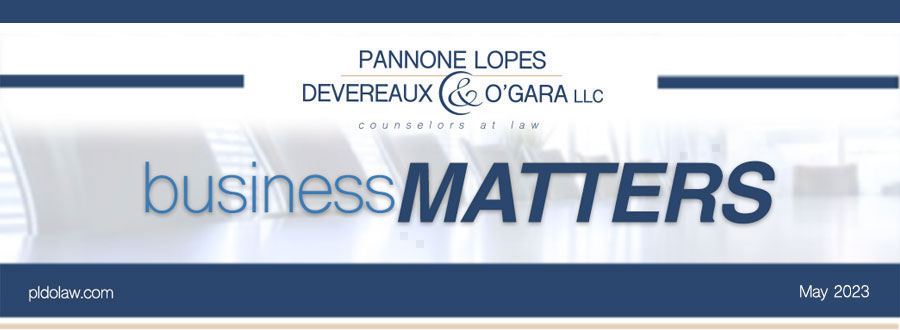THIS ISSUE'S HEADLINES
The Same-Protected-Class Inference: Complaints of Discrimination in the Workplace
The Rise of the Robots: Attorney Lamoureux Tackles ChatGPT on WPRO’s Matt Allen Show
Keys to the Kingdom: Balancing Merit Vs. Inherit Models in the Family Business

THE SAME-PROTECTED-CLASS INFERENCE: COMPLAINTS OF DISCRIMINATION IN THE WORKPLACE
 Diversity, equity, and inclusion is an integral part of today’s work environment. Many clients have inquired into whether an employee in a particular protected class could discriminate against another employee in that same protected class. The answer to that question—which may come as a surprise to some—is yes. Put simply, there is no “same protected class” super defense to a discrimination claim. Diversity, equity, and inclusion is an integral part of today’s work environment. Many clients have inquired into whether an employee in a particular protected class could discriminate against another employee in that same protected class. The answer to that question—which may come as a surprise to some—is yes. Put simply, there is no “same protected class” super defense to a discrimination claim.
After being terminated from her employment, the plaintiff in Ilana Gamza-Machado de Souza v. Planned Parenthood Federation of America, Inc. filed suit against her former employer and supervisors, alleging in part that she was discriminated against on the basis of her race and religion. In their motion for summary judgment, the defendants argued that one of the supervisors could not have acted discriminatorily towards the plaintiff because both the plaintiff and the supervisor belonged to the same protected classes.
In its decision, the Court stated that, while it could have drawn an inference that the plaintiff was not discriminated against because the alleged bad actor was in the same protected classes as the plaintiff, that presumption would not be conclusive. According to the Court, because the alleged bad actor made a discriminatory remark about a different employee in her same protected classes, and because the supervisor participated in the decision to terminate the plaintiff’s employment along with other management-level employees, a reasonable jury could find that the supervisor decided to terminate the plaintiff’s employment in part due to her race and religion, even though the supervisor belonged to the same race and religion.
Employers must take all reports of discrimination in the workplace seriously, ensuring they are not dismissive of an employee’s complaint simply because of a commonality in protected classes among the employee and the alleged bad actor. Protected classes under Rhode Island law include race or color, religion, sex, sexual orientation, gender identity or expression, disability, age, or country of ancestral origin.
For more information on how to adequately address complaints of discrimination in the workplace, or if you have any questions, please contact PLDO Attorney Kathryn M. Couture at 401-824-5100 or kcouture@pldolaw.com.
[back to top]

THE RISE OF THE ROBOTS: ATTORNEY LAMOUREUX TACKLES CHATGPT ON WPRO’S MATT ALLEN SHOW
 Since its recent grand entrance to the world stage, ChatGPT has been infiltrating and proliferating past the tech realm and into the business world. As Artificial Intelligence (AI) continues to advance, more companies are turning to these technologies to replace human workers in certain roles. For example, Boston Dynamics’ “robodogs” are now being equipped with ChatGPT to speak and respond to people’s questions in real time. Since its recent grand entrance to the world stage, ChatGPT has been infiltrating and proliferating past the tech realm and into the business world. As Artificial Intelligence (AI) continues to advance, more companies are turning to these technologies to replace human workers in certain roles. For example, Boston Dynamics’ “robodogs” are now being equipped with ChatGPT to speak and respond to people’s questions in real time.
The use of AI in the workplace is still in its infancy. However, if the past few months are any indication, AI will soon make a tremendous and imminent impact on how businesses operate. This raises a host of important ethical legal and ethical questions, such as privacy, job displacement, cost-cutting, discrimination, bias, and cybersecurity concerns. As more and more companies consider how to implement AI into their business operations, they will have to tackle these important issues to ensure they remain legally compliant and protect themselves from lawsuits by regulators, employees, and investors.
PLDO Partner Brian J. Lamoureux was recently interviewed by WPRO's Matt Allen to discuss the opportunities and risks surrounding ChatGPT. Click here to listen to the interview.
Attorney Lamoureux is a member of the firm’s litigation, employment, corporate, and cybersecurity teams. He is also a Practitioner Faculty member at Providence College, where he created and teaches an MBA-level course called “Digital and Social Media in the Business Environment.” Attorney Lamoureux can be reached at 401-824-5155 or by emailing bjl@pldolaw.com.
[back to top]

KEYS TO THE KINGDOM: BALANCING MERIT VS. INHERIT MODELS IN THE FAMILY BUSINESS
 A recent article published by Harvard Business Review outlines the importance of distinguishing between merit compensation and inheritance.1 In most family businesses, the second generation inherit positions and compensation, which is usually a formula for disaster. In many cases, they are not qualified for the positions that they are given in the business. This often leads to morale issues for non-family member employees and could play a significant factor in the underperformance of the business. Balancing the so-called “merit” or “inherit” factors is difficult but necessary for the survival of the business for future generations. A recent article published by Harvard Business Review outlines the importance of distinguishing between merit compensation and inheritance.1 In most family businesses, the second generation inherit positions and compensation, which is usually a formula for disaster. In many cases, they are not qualified for the positions that they are given in the business. This often leads to morale issues for non-family member employees and could play a significant factor in the underperformance of the business. Balancing the so-called “merit” or “inherit” factors is difficult but necessary for the survival of the business for future generations.
How the next generation are treated is challenging because it impacts non-family members and/or potential buyers, as well as the culture within the company. It is critical to avoid providing special treatment to family business members. The author calls giving the next generation special treatment as the “inherit” model vs. holding the next generation accountable and requiring them to earn their rights in the company as the “merit” model, and concludes that balancing both models is the key to a successful generational transfer of the business.
Preventing a sense of entitlement fosters a healthy environment within the business; however, constructing a win-lose scenario may create a divisive atmosphere that must be avoided at all costs. Forcing family members to work for the company is no better than handing over the keys to the kingdom.
The popular HBO show "Succession" is a profound illustration of these perils. The fictional series is based on the drama between Rupert Murdoch and his children as they fight for control of the global media and entertainment conglomerate amid uncertainty about the show's family patriarch/company founder’s health. The children's sense of entitlement is a key theme and cause for the company's disfunction and (fictional) demise.
Family members must understand that they earn compensation and a company position, while they may also inherit ownership at some point during their lifetime. To avoid a damaging sibling rivalry and at the same time treat each sibling fairly, compensation should be driven by merit and reflect the market value of the role being played in the company. For example, the CFO should be paid more than the someone who works in production. Dividends should be also based on the inherit model, which clearly differentiates this profit-sharing mechanism from compensation.
In this article, the author provides an example to illustrate the difference between decisions made by management vs. those relating to ownership. In one family business, two siblings became owners by virtue of a gift from the father who was the founder of the company. The siblings made all operational and strategic decisions, and the employees respected their decisions because both siblings were fully invested in the business. The next generation in both families involved seven children, three of whom worked in the business and four who did not and had no intention of becoming involved. Who should be making company decisions when all of the children were owners and the four that were not involved owned a majority of the shares in the business? The solution to this dilemma was to distinguish the decisions needed to be made by merit vs. inherit. In this case, the siblings created a list of all decisions and developed categories for ones that should be made by management; ones that should be made by ownership and ones that should be made by ownership based upon management’s recommendations. This approach exemplifies finding the right balance between merit and inherit.
In conclusion, striking a balance between the merit and inherit models, differentiating between compensation and dividends, as well as management versus ownership decisions, and preventing a sense of entitlement are keys to a successful transition of a family business to future generations. If you have questions pertaining to a family-owned business, please contact PLDO Managing Principal Gary R. Pannone at 401-824-5100 or email gpannone@pldolaw.com.
[back to top]
|




 Diversity, equity, and inclusion is an integral part of today’s work environment. Many clients have inquired into whether an employee in a particular protected class could discriminate against another employee in that same protected class. The answer to that question—which may come as a surprise to some—is yes. Put simply, there is no “same protected class” super defense to a discrimination claim.
Diversity, equity, and inclusion is an integral part of today’s work environment. Many clients have inquired into whether an employee in a particular protected class could discriminate against another employee in that same protected class. The answer to that question—which may come as a surprise to some—is yes. Put simply, there is no “same protected class” super defense to a discrimination claim. Since its recent grand entrance to the world stage, ChatGPT has been infiltrating and proliferating past the tech realm and into the business world. As Artificial Intelligence (AI) continues to advance, more companies are turning to these technologies to replace human workers in certain roles. For example, Boston Dynamics’ “robodogs” are now being equipped with ChatGPT to speak and respond to people’s questions in real time.
Since its recent grand entrance to the world stage, ChatGPT has been infiltrating and proliferating past the tech realm and into the business world. As Artificial Intelligence (AI) continues to advance, more companies are turning to these technologies to replace human workers in certain roles. For example, Boston Dynamics’ “robodogs” are now being equipped with ChatGPT to speak and respond to people’s questions in real time.  A recent article published by Harvard Business Review outlines the importance of distinguishing between merit compensation and inheritance.1 In most family businesses, the second generation inherit positions and compensation, which is usually a formula for disaster. In many cases, they are not qualified for the positions that they are given in the business. This often leads to morale issues for non-family member employees and could play a significant factor in the underperformance of the business. Balancing the so-called “merit” or “inherit” factors is difficult but necessary for the survival of the business for future generations.
A recent article published by Harvard Business Review outlines the importance of distinguishing between merit compensation and inheritance.1 In most family businesses, the second generation inherit positions and compensation, which is usually a formula for disaster. In many cases, they are not qualified for the positions that they are given in the business. This often leads to morale issues for non-family member employees and could play a significant factor in the underperformance of the business. Balancing the so-called “merit” or “inherit” factors is difficult but necessary for the survival of the business for future generations.